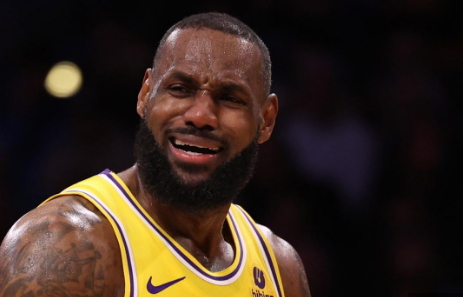
The Los Angeles Lakers’ Tuesday night game against the Phoenix Suns came with an unexpected outcome and a rough night for LeBron James. In a surprising turn, James, known for his consistency and physical resilience, faced one of the rare performance struggles of his career, resulting in a 115-105 loss. This game highlighted LeBron’s vulnerability—a rarity over his nearly two-decade career and a possible sign of things to come for both James and the Lakers this season.
Off Night for the King
LeBron’s performance, a barometer for the Lakers’ success, was unusually subdued in the face of the Suns’ relentless defense and fast-paced offense. James managed only 15 points, shooting an uncharacteristic 5-for-16 from the field. His three-point game, typically a strength, faltered as he went 1-for-7 from beyond the arc. Although he added seven rebounds and four assists, it wasn’t enough to offset the Lakers’ struggles on either end of the court.
For a player who has consistently dominated games well into his late 30s, LeBron’s off night caught fans and analysts off guard. Given his reputation for elite conditioning and adaptability, the downturn led some to question whether age and mileage on his body could finally be taking a toll.
**Fatigue and Changing Role?**
The dip in James’ performance could be attributed to a combination of factors. At 39, he remains the oldest player in the NBA, and although he’s shown an impressive ability to perform at an elite level despite age, the demands of a high-paced, competitive season may now come with tougher recovery periods. The Lakers have also emphasized load management this season, hoping to keep LeBron fresh for a playoff push. However, while he sat for several minutes in the first half, when he returned, he struggled to find a rhythm against the Suns’ younger, fresher lineup.
Moreover, with the Lakers looking to integrate younger talent such as Austin Reaves and Rui Hachimura, LeBron’s role has subtly shifted to allow them to take on more scoring and playmaking responsibilities. This transitional phase, while potentially beneficial in the long term, may be causing temporary disruptions in LeBron’s flow on the court.
Suns’ Defense Steps Up
Phoenix, without Bradley Beal and with Devin Booker on limited minutes, leaned heavily on their defense. Kevin Durant, known more for his offensive prowess, showcased versatility by frequently guarding LeBron, forcing him into challenging shot selections. The Suns also employed double-teams and quick rotations, disrupting LeBron’s typical attack modes and limiting his chances for high-percentage looks in the paint.
Phoenix head coach Frank Vogel, who coached LeBron during the Lakers’ 2020 championship run, may have insight into LeBron’s playing style, using it to construct a defensive strategy that capitalized on Los Angeles’ spacing issues. The Suns’ defense, combined with the pressure to keep up with Durant’s and Booker’s offensive output, made for a challenging game for James and his teammates.
What’s Next for LeBron and the Lakers?
While one rough night isn’t a reason for panic, LeBron’s performance could signal the beginning of a gradual shift for both the Lakers and James himself. If the Lakers plan to make a serious playoff run, they may need to adjust to support him differently. This could mean more offensive involvement from Anthony Davis, who finished with a strong double-double against the Suns, and a continued emphasis on developing young players who can carry some of the scoring load.
Ultimately, James has proven time and time again that he can defy age and expectations. But as the Lakers navigate the new season, one tough night may be an early indicator of evolving strategies and the necessity for the Lakers to maximize every available resource around their aging superstar.
LeBron and the Lakers face a long season ahead, and the adjustments they make now may be key to sustaining success, even as “Father Time” seems closer than ever before to catching up with one of the game’s greatest.

Leave a Reply